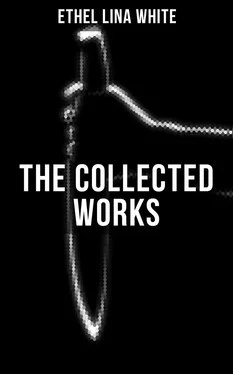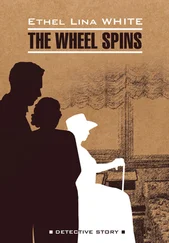"But—but—it's impossible ," he said, at last.
Miss Asprey held out the letter, with fingers which trembled slightly.
"Read it," she repeated.
To his eternal credit—for he was consumed by curiosity—the Rector refused.
"No," he said. "You may wish me to read it tonight, but you'll probably think differently, tomorrow."
Miss Asprey shook her gleaming silver head.
"I've nothing to fear from tomorrow, and I fear no one," she told him. "But, after reading this, perhaps, I fear myself. It fills me with doubts—makes me wonder if I know my own heart—as it really is. If I were a Roman Catholic, I should unburden myself in the Confessional. As it is, I have no other course but to ask you to read this letter, and then—if you can—grant me Absolution."
"If that is really your wish, then I'll read it."
Having made his protest, the Rector picked up the letter briskly. It was printed, in block letters, on paper of excellent quality, and was correctly composed and spelt. It began with I the sentence—'You presumed to sit in judgment on unfortunate women whom you dragged out of the gutter, probably against their own wish, but are you, yourself better than the lowest of these?' It continued in the same strain, each line covered with the slime of insinuation, as though a slug had crawled over the pages.
The Rector exploded several times as he read it, and, at the end, he crushed it up angrily between his strong fingers and threw it on the floor.
" Foul ," he declared. "Any anonymous letter is a knife in the back, but this one is specially outrageous...Can you tell me, Miss Asprey, if you have any—any suspicions as to the writer?"
"No," replied Miss Asprey. "Besides, the writer does not matter. I only want to know what you think of me."
True to his impulsive nature, the Rector acted without forethought. On this occasion, his muscles leaped to obey his instinct, before his mind creaked into motion, so that he was betrayed into a theatrical gesture. Stooping down, he kissed Miss Asprey's thin white hand, in silent homage.
Before he could feel ashamed, he was rewarded by the glitter of suppressed tears in her eyes.
"That's what I think," he told her. "But I also think that some evil-minded person is jealous of you."
As the door creaked slightly he looked up sharply, and then picked up the letter. Presently he glanced towards Miss Mack, who sat, watchfully, in the shadow of the wall, and pounced on her with a question.
"How do you spell 'judgment,' Miss Mack?"
As he had expected, she spelt it, 'judgement'.
"Exactly," he muttered. "Thank you." He turned to Miss Asprey. "This letter has been written by an educated person. Now, what, exactly, is your wish? Shall I try to trace it back to its source?"
"But can you do that? It is anonymous."
"I haven't the foggiest idea. But I have a friend—a chap with nothing to do, who's potty on puzzles. He'd enjoy getting his teeth into it."
Miss Asprey's answer was to replace the letter on the salver, and to apply a lighted match to one corner.
"That is what I'm going to do with the letter," she said. "My mind is now completely at rest again."
As she watched the paper blaze and then crumble into dust, her expression grew tranquil and the strain faded from her eyes.
But the Rector was suddenly rent with a vague foreboding of future evil. Acting on impulse, he picked up the envelope, which had begun to catch fire, and pinched out the charred patch.
"May I keep this?" he asked. "It may come in useful, supposing there's another letter."
Miss Asprey hesitated and then bowed her stately head.
"Certainly," she said. "But I am confident the matter is ended...Thank you for coming. Good night."
Miss Mack pattered across to the door, which she opened, to make the Rector understand that he was dismissed. He lingered, as he wondered whether he should try to repeat his success, and kiss the hand of the afflicted lady in farewell. But she seemed to have forgotten his existence, so he followed Miss Mack's hint, and left.
He carried away with him a memory of Miss Asprey's face glimmering whitely against the dark wood, as though she were already enshrined, and fading away to the bleak immortality of a saint.
He walked slowly back to the Rectory, in a depressed mood, and horrified at the mere idea that his perfect village sheltered a poisonous mind. But as he passed each person of the limited social circle in review, he was able to shake his head and brace his shoulders, as though he had shaken off a load.
No one he knew could have done this thing. To his mind, it was obvious that this letter had been written by some unbalanced person who had known Miss Asprey in the past, and who bore her a grudge. The fact that the envelope was stamped with the village post-mark was of small importance, as this subterfuge could be arranged.
When he entered his cheerful study, the whisky was on the table and the Wireless turned on. The essential parts of a fat spaniel—named 'Charles', after Dickens—were crowded on the doctor's lap, while the dog, from his intelligent look, was helping their guest to solve a chess-problem in the evening paper.
"Well?" asked Dr. Perry eagerly.
"Well," echoed the Rector, crossing to the table and juggling hospitably with the various bottles. "Soda or plain water, doctor? Say 'when'."
Dr. Perry bit his lip and pulled Charles' silky ears for moral support, before he repeated his question.
"Well? Was it so important?"
The Rector laughed as he hunted in a cupboard for the biscuit-barrel.
"It was nothing," he said. "She was just a bit upset. That's all."
"I see," said the doctor quietly. "That's all." He took his glass. "Thanks. 'Prosit'."
The Rector felt sorry for his baffled curiosity, but he was guarding the secret of the Confessional. He turned to his dog, who was registering all the symptoms of acute starvation at the sight of the biscuits.
"Here you are, Charles," he said, tossing him a cracknel. "You're an overfed scoundrel, but you know your poor fish of a master can't resist a moist nose and swimmy eyes. But it's no good our friend the doctor looking pathetic, is it, Charles? We've nothing for him. By the way, doctor, please don't mention the fact that Miss Asprey sent over for me this evening."
"I quite understand." Dr. Perry laughed acidly. "You're giving me my own medicine—'Shall a doctor tell?'...My dear padre, not for worlds would I wish you to betray a confidence. There is no one I respect more than Miss Asprey, although there are many I like better. I am sorry she has suffered annoyance."
"How do you know she has?" asked the Rector.
"I don't, so, naturally, my mind is busy with every absurd impossibility...Well, I suppose I must go home and see if I still have the same wife."
Dr. Perry glanced at the clock, tossed off his whisky, and rose to go.
"Good-bye, padre," he said, patting Charles' head. "I admire you for your admirable policy of silence, and I bear you no ill-will."
The Rector's jaw dropped in surprise as the doctor added, "But I confess I should have liked your account of how the saintly Miss Asprey defended her honour."
Table of Contents
When Miss Asprey declared that the affair was ended she did not know that the parlourmaid was listening outside the door. Rose lingered in the hall, not only to satisfy her own curiosity, but to be forewarned of any annoyance which might threaten her mistress.
She possessed a testimonial from a Bishop's wife to prove her loyalty and discretion, and she did not repeat an actual word of what she overheard. But—like an unconscious germ-carrier—she liberated the poison in her system by gradual leakage. Somehow or other, she conveyed an impression to the cook, who transferred it to the beautiful Ada, in the form of a hint. Ada promptly elaborated this to a whisper, and then passed it on to the Squire's chauffeur.
Читать дальше












